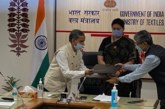 South Asia Policy Dialogue on Regional Cooperation for National Food Security Startegies held in New Delhi on 13-14 August 2913 by ESCAP-SSWA.
South Asia Policy Dialogue on Regional Cooperation for National Food Security Startegies held in New Delhi on 13-14 August 2913 by ESCAP-SSWA.
The United Nations Economic and Social Commission for Asia and the Pacific South and South-West Asia Office (ESCAP-SSWA), organized the South Asia Policy Dialogue on Regional Cooperation for Strengthening National Food Security Strategies, which kicked off Tuesday 13 August in New Delhi, India.
As the Parliament of India debated the milestone National Food Security Bill, some 90 food security experts and policy makers from seven countries in South Asia converged in New Delhi to discuss priorities for accelerating effective regional cooperation for food security.
“Asia accounts for about half of the world’s undernourished population, of which two thirds are from South Asia. This is a major cause of concern… South Asia has a high stake in confronting global hunger and malnutrition”, stated H.E. Prof. K.V. Thomas, Minister of State for Consumer Affairs, Food and Public Distribution, Government of India while inaugurating the Policy Dialogue. “South Asian countries share not just their past, but their future, too”, the Minister noted. Describing the historic and “gigantic scale” of the currently debated National Food Security Ordinance — which would entitle 67 per cent of India’s 1.2 billion people to receive highly subsidized food grains every month — H.E. Prof. K.V. Thomas stated that India would not “shy away from extending any help in terms of expertise, wisdom and friendship” to other South Asian countries for enhancing food security.
Dr. Rabindra Kumar Shakya, Vice-Chairman, Planning Commission, Government of Nepal who also participated in the policy dialogue, stressed the vital urgency of addressing the issue of food insecurity, which affects the lives of over 300 million persons in South Asia.
“Never before has it been so urgent to pursue regional cooperation to improve food security in South Asia and strengthen mechanisms to boost production and insulate vulnerable populations against food price volatility,” Dr. Shakya stated.
Food insecurity and hunger are widely prevalent across South Asia and is estimated to affect some 317 million people – levels considered as alarming according to the Global Food Security index. Every third food insecure person and every second underweight child in the world are living in the subregion.
 The issue of food security in South Asia is multifaceted and complex, replete with challenges such as small size of land holdings, low productivity, long supply chains, high transaction costs and post harvest losses and wastes. In addition the situation is compounded by high prevalence of poverty, low levels of human development and other related development indices, and high population growth.
The issue of food security in South Asia is multifaceted and complex, replete with challenges such as small size of land holdings, low productivity, long supply chains, high transaction costs and post harvest losses and wastes. In addition the situation is compounded by high prevalence of poverty, low levels of human development and other related development indices, and high population growth.
As intraregional agricultural imports among countries in South Asia stand at merely 8.5 per cent of total agricultural imports, according to Dr. Saman Kelegama of the Institute of Policy Studies of Sri Lanka, many opportunities exist to enhance regional cooperation for food security in South Asia, such as exchanging best practices and collaborating on agricultural research, also building on existing mechanisms such as the SAARC food and seed banks.
The Policy Dialogue aims to foster a common understanding of the opportunities and challenges for developing regional cooperation mechanisms for food security in the subregion, including through evolving regional knowledge networks and identifying regional priorities for effective national food security strategies.
The Policy Dialogue was also addressed by Ms Lise Grande, United Nations Resident Coordinator and Dr. Nagesh Kumar, Chief Economist, ESCAP and Director, ESCAP-SSWA.
“Countries in South Asia have each different ways to tackle the many issues surrounding food security… It is notable that the rights-based approach to food security is gaining ground. Right to food has been explicitly incorporated in Nepal’s interim constitution and other South Asian countries recognize the importance of right to food as a directive principle for the State. With the Food Security Bill, India is moving firmly towards a rights-based approach to food security, said Dr. Nagesh Kumar. “Good practices need to be shared to facilitate a better understanding of effective food security strategies in the subregion”.
Describing the policy dialogue as historic, Mr. Muhammad Javed Malik, Member of Pakistan Planning Commission said the countries in South Asia need to pool their resources to enhance agriculture productivity, learn from one another, and share their agricultural products given their contiguous location.
Participants also recognized the importance of strengthening the SAARC Food Bank, SAARC Seed Bank and the South Asian Free Trade Area towards facilitating agricultural trade while stressing the importance of harmonizing standards. They also discussed the need for creating a milk grid for the subregion to take care of demand supply mismatches.
Raising concerns about increasing privatization of knowledge in agriculture, Mr. T. Nanda Kumar, Member of the National Disaster Management Authority of India, made a case for increased public investment on agriculture research, development and extension for enhancing agriculture productivity. He also made a case for regional cooperation in weather forecasting and in managing transboundary spread of pests and veterinary diseases.



